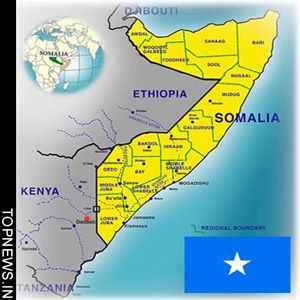Somali elders in fresh attempt to free US captain
 Nairobi - Somali elders on Sunday began a fresh attempt to secure the release of an American captain being held hostage by pirates on a lifeboat surrounded by US Navy warships, reports said. The move comes a day after other pirates seized an Italian tugboat - the seventh vessel taken in the last nine days.
Nairobi - Somali elders on Sunday began a fresh attempt to secure the release of an American captain being held hostage by pirates on a lifeboat surrounded by US Navy warships, reports said. The move comes a day after other pirates seized an Italian tugboat - the seventh vessel taken in the last nine days.
Pirates have been holding Captain Richard Phillips hostage on the lifeboat since Wednesday, following a failed attempt to hijack his ship, the Maersk Alabama , in the Indian Ocean 500 kilometres off the coast of Somalia.
Earlier negotiations broke down on Saturday just hours after the pirates fired on a small US navy vessel that approached the lifeboat, the New York Times reported.
US Defence Department spokesman Major Stewart Upton said concern for Phillips meant that no information on the ongoing operation could be released.
However, other officials, speaking anonymously, said the sticking point appeared to be an American demand that the pirates be handed over to the authorities in Puntland, the semi-autonomous region of Somalia where most of the pirates are based.
The pirates want to be allowed to land the lifeboat, which is now reportedly only a few dozen kilometres from the coast, and set free before returning Phillips.
Earlier reports said the lifeboat had run out of fuel. It is unclear how the lifeboat managed to get so close to the coastline.
Media reports said that Somali elders set off from the port of Eyl on Sunday in a fresh attempt to find a compromise that will secure Phillip's release.
The pirates have warned the US Navy against attempting to copy France and using force to free Phillips.
French naval forces on Friday stormed a yacht and freed four hostages. However, two pirates and one hostage died during the operation.
US network CNN reported that the coastal port of Harardhere, used by pirates as a stronghold, was buzzed by two unidentified helicopters on Sunday morning.
Residents of the town fled in panic, believing an air raid was about to take place, CNN reported, citing a local Somali journalist.
The lifeboat is surrounded by three US vessels, which have so far deterred attempts by other pirates to reinforce their colleagues.
A separate pirate group tried to steam the 20,000-ton Hansa Stavanger - a German-owned container ship hijacked one week ago - to help the embattled group of pirates, but was forced to return to anchor.
The Alabama - a 17,000-ton cargo vessel carrying food aid and operated by US company Maersk Line, Limited - was boarded by the pirates Wednesday morning, the first time US sailors have been seized in the treacherous waters near the Horn of Africa.
The unarmed crew quickly retook the ship, however.
The Alabama arrived under guard in the Kenyan port of Mombasa on Saturday night, where some crew members, dressed in blue overalls and helmets, defied orders from the FBI not to discuss the hijacking and shouted out to waiting journalists.
Accounts from the crew said that the pirates appeared on a small boat and then used grappling hooks to board the ship, firing shots in the air as they came.
Phillips then reportedly gave himself up to the pirates in order to safeguard his crew, something that second mate Ken Quinn said made him a "hero."
John Reinhart, chief executive of Maersk Line, told reporters that the crew were required to stay on board during investigations and that the priority was securing Phillip's safe release.
Somali pirates have stepped up their attacks in recent weeks after a brief lull.
Pirates hijacked a tugboat, the Buccaneer, on Saturday. It was the seventh vessel to have been seized in just over a week.
Andrew Mwangura of the East African Seafarers' Association said Sunday that the vessel had reached the Somali coast and that the crew of 16 - including 10 Italians, five Romanians and a Croatian - was unharmed.
Another ship sailing under a Turkish flag narrowly escaped capture on Saturday, using water hoses to repel pirates after they fired a rocket-propelled grenade at the ship.
In 2008, pirates seized over 40 vessels in and around the Gulf of Aden and collected tens of millions of dollars in ransom, prompting the international community to send warships to the region.
Around 15 warships from the European Union, a coalition task force and individual countries such as Russia, the United States, India and China patrol an area of about 2.85 million square kilometres.
However, the pirates are now venturing farther into the Indian Ocean off the south-east coast of Somalia to avoid the international patrols.
Observers have said they feel piracy can only be stopped by dealing with insecurity on the ground in Somalia. (dpa)